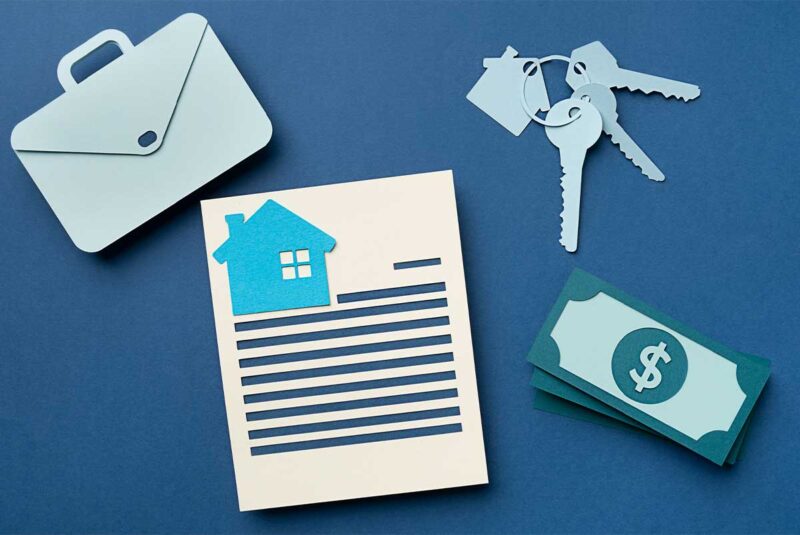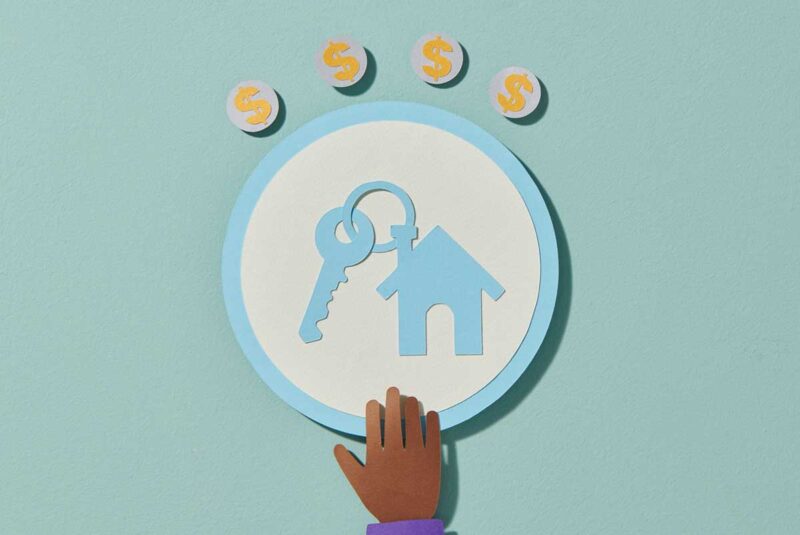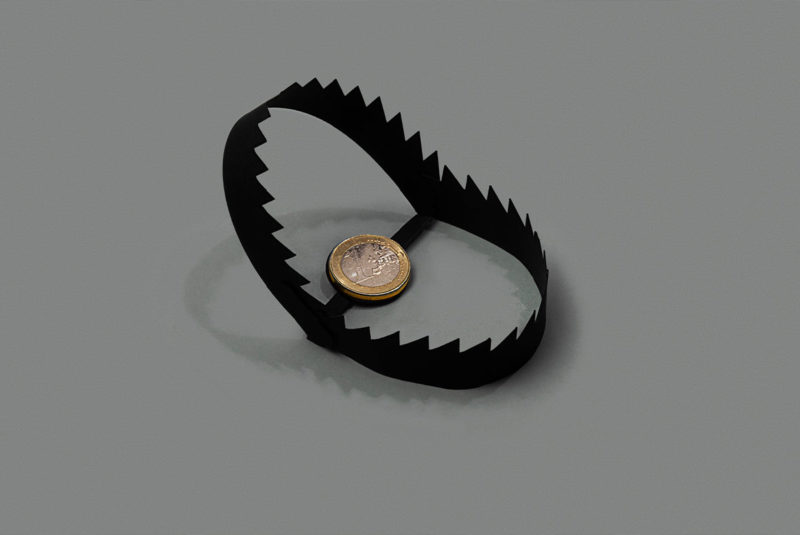Ready To Buy a Home?
Get Approved to Buy a Home
Rocket Mortgage® lets you get to house hunting sooner.
Just when you thought you learned everything you needed to learn about buying a home, you come face-to-face with one of the last pieces of the process: closing costs.
In a 2020 survey of REALTORS®, the National Association of REALTORS® reported that 25% of people ready to buy weren’t fully educated on closing costs.[1]
Handing over house keys sounds like something that should only take 20 seconds and a firm handshake, but in reality, the process is a bit more involved.
A property transfer is a legal process. Transferring a home from one owner to another takes a bit of work. And by work we mean: plenty of paperwork, necessary expenses and conversations with a few real estate professionals to make the purchase official.
Before you put down that cash to close, update your status to “homeowner” on all the socials and start planning the housewarming party of the century, it’s important to learn what makes up closing costs, who pays what and – everyone’s favorite part – how to cut down on big bills.
What Are Closing Costs?
Closing costs are extra expenses on top of the purchase price of the home that cover the final transfer of property.
(Think: lender and real estate lawyer fees, mortgage finalization/insurance, processing fees, taxes and more.)
Closing costs aren’t just for buyers either. Both buyers AND sellers pay closing costs.
What’s paid by the buyer or the seller (and how much is paid) isn’t set in stone. Some costs are negotiable.
How Much Are Closing Costs?
There’s no fixed dollar amount we can offer because closing costs are determined using lots of factors. Some of the biggest factors are:
- The condition of the home
- The mortgage lender
- The mortgage loan type
Not knowing the exact dollar amounts upfront can be frustrating, but you can go into the closing process with some idea of what to expect.
In 2020, average home closing costs (including taxes) totaled $6,087, according to ClosingCorp. The highest closing costs were paid in Washington, D.C., at an average of $29,329. The lowest closing costs, at an average of $1,571, were paid in Missouri. The Northeast, mid-Atlantic and West Coast tend to have higher housing and closing costs than Midwestern and Southern states.
In general, closing costs average 3% – 6% of the home’s purchase price.
If you’re at the start of your housing journey and you’re creating a house buying budget for your new digs, use this range to estimate what you’d need to budget for your closing.
If you’re at the borrowing stage of the home buying journey, use the loan estimate you get after applying for a mortgage to calculate your closing costs. (The loan estimate should include estimated closing costs.)
Before closing on your loan, you’ll also get a Closing Disclosure that lists your final costs. There shouldn’t be a big cost difference between what’s on the loan estimate and what’s on the Closing Disclosure. If there is, get a hold of your lender or real estate attorney ASAP.
How Do You Calculate Closing Costs?
If you’ve been craving a throwback to high school math class, you’re in luck. First, you’ll need to sharpen a pencil or open up your calculator app. Next, start adding up all the possible fees that might apply on closing day.
If you’re not sure where to start, you can use some key predictors to ballpark what you might pay on closing day. Apply average percentages from your lender (or regional averages if you’re not at the borrowing stage yet) and take the following into account:
- The home’s estimated cost
- Expected down payment and its percentage of the total amount of the home purchase
- Expected interest rate
Or you can use our mortgage calculator to help you do the math a little faster.
What Fees Can You Expect at Closing?
Buyers don’t have to pay all the closing costs. But they do have to pay most of them – unless a negotiation turns the tables and they can convince the seller to cover some of their fees or have their lender waive others.
Even though there are usually fewer expenses to calculate for the seller, their closing costs can be higher. Sellers pay the agent commission for both the buyer and the seller. The total cost of agent commissions can be higher than what a buyer has to pay in closing costs.
Here’s how closing costs typically break down, including who pays what and their average fees:
Buyer closing costs and fees
Application: This fee covers mortgage application processing and averages around $300.
Appraisal: This pays for an appraiser to determine the value of a home before moving forward with a purchase. Appraisal fees average $300 – $400.
Attorney: Real estate attorneys make sure the purchase process follows the law. Legal fees can be per hour or a flat rate and average between $500 – $1,500. Not all closings require using an attorney, but in some states it’s mandatory.
Courier: This fee covers the transporting of documents and costs around $20.
Credit report: This may be necessary as part of the application process. It may be free or require a small processing fee that is usually around $25.
Discount points: Buyers can opt to buy discount points. A discount point (aka mortgage point) costs 1% of the mortgage loan. If a buyer can afford it, it’s a worthwhile purchase that reduces costs over the long term.
Escrow fees: These are paid to the escrow agent to cover the costs of transferring funds. These fees can be around 1% of the home’s purchase price depending on the escrow company. Buyers and sellers often split this cost.
Insurance: Fees for different types of insurance – like title insurance for the lender and the owner, FHA insurance and homeowners insurance – are usually paid at closing. With a conventional loan, a down payment of less than 20% usually triggers private mortgage insurance (PMI). Insurance costs can range anywhere from several hundred dollars to $1,000 or more.
Flood certification: A flood certification, which usually costs about $20, states whether a house is in a flood zone. If it is, the buyer must purchase flood insurance as well as standard homeowners insurance.
Homeowners association transfer: For homes in an HOA, there may be a fee when ownership is transferred. This fee can cover things like changing lock codes, updating database information and copying keys.
Loan origination: Also known as an underwriting fee, this usually costs around 0.5% – 1% of the loan and covers the cost of preparing the mortgage, notary services, document generation and the lender’s attorney fees.
Inspection: An inspection can uncover major problems with a home, including lead-based paint, foundation damage, pest problems, building code violations and other problems that could make a buyer reconsider the home’s purchase. The average inspection costs $300 – $500.
Prepaid daily interest charges: Lenders often require borrowers to prepay any interest that accrues between closing day and the day their first mortgage payment is due. For a $200,000 home with a 3% mortgage interest rate, 10 days of prepaid interest would cost around $160.
Property tax: In most areas, buyers pay 2 – 6 months of property taxes at closing. This can vary depending on the home’s location and value, but it usually costs around $300 – $600.
Rate lock: For buyers who put a small deposit down to make sure their mortgage interest rate doesn’t change, the cost to rate lock is usually a fraction of a percent of the loan’s value. It can be as little as 0.25% to 0.5%.
Recording: These fees, which average around $125, cover the cost of the legal recording of the new deed and mortgage.
Survey: Surveys look into things like property lines, easements and topography. If a land survey is required, it’s usually paid for by the buyer. Surveys cost around $400 – $700.
Tax monitoring and tax status research: This fee is paid to a company that assesses property tax and determines the amount that needs to be paid each year. The fee is usually a few hundred dollars, and it may need to be held in an escrow account.
Title search: This search makes sure that the seller legally owns the property and can sell it to you. Title searches cost around $200.
Transfer tax: This tax covers the transfer of property from one owner to another. The cost depends on the area, but it’s usually around 1% of the property price.
Department of Veterans Affairs (VA), U.S. Department of Agriculture (USDA) or Federal Housing Administration (FHA) funding: Some government loan programs (like VA, USDA and FHA programs) have separate closing costs. These are usually 1% – 2% of the loan amount but can vary between loan types.
Seller closing costs and fees
Attorney: Sellers can choose to have an attorney, too. They will either pay a flat fee or an hourly rate.
Seller concessions: This is money the seller agrees to apply toward the house purchase. These credits are an extra incentive for buyers, and the amount can vary. Sometimes, if repairs are needed on the house, the seller will credit the buyer for these costs at closing if they decide not to make any repairs before closing. But the credits can be for anything the buyer and seller agree on.
Escrow: Sellers usually split escrow costs with buyers. The costs can average around 1% of the sale price of the home.
HOA: If a seller lives in an HOA, they will have to pay their fees until the closing is completed.
Prorated property: If property taxes aren’t up to date at closing, a seller may have to pay a prorated amount to cover the time between the seller’s last payment and when the keys change hands.
Real estate agent commission: The average real estate agent charges 2% – 3%, which means a seller could be on the hook for 4% – 6% of their home’s sale price because they are responsible for paying their agent’s commission and the buyer’s agent’s commission. For a $200,000 property, agent commissions could cost around $12,000.
Mortgage recording and transfer taxes: If a buyer doesn’t pay these fees, the seller will have to pay up. The total for mortgage recording and transfer taxes is usually around 1% of the home’s sale price. In some cases, these costs are split between the buyer and seller.
Title insurance: This seller’s expense benefits the buyer and protects the buyer from problems related to a home’s title. Title insurance can cost between $1,000 – $4,000. If the home is being sold 10 years after it was bought, the seller may qualify for a reissued policy at a discount.
Wondering How To Reduce or Avoid Closing Costs?
If the idea of coughing up even more cash is beginning to feel daunting, you might be in luck. There are ways to potentially reduce or eliminate some closing costs.
- Compare your loan estimate to your Closing Disclosure forms for any red flags: If there are fees in the Closing Disclosure that weren’t in the estimate or can’t be explained by the lender, you may be able to push back. You can also push back on low-cost items, like courier fees, if you think they’re too high.
- Shop around for lenders: Be proactive about any closing costs concerns. Shop around before you apply for a mortgage. Some lenders offer lower closing costs than others.
- Sweet talk the seller: In a buyer’s market, it may be possible to convince a seller to take on more costs. If a seller wants a fast sale or their home has been on the market for a minute, they may be willing to cover some extra costs to entice a buyer.
- Consider a little negotiation on loan-specific fees: Not all fees are set in stone. A little negotiation with a lender could result in some savings.
- Roll closing costs into your mortgage: If you know you won’t have cash on hand to pay all of your closing costs, you may be able to roll some or all of your costs into the mortgage. This could be a solid short-term fix. Just keep in mind that you’ll be paying these costs over the length of the mortgage loan.
- Schedule the closing at the end of the month: Timing doesn’t affect all closing fees, but scheduling a month-end closing may reduce how much you pay in property taxes, prepaid interest and HOA fees.
It’s worth exploring your options to see how you might trim some costs and save some cash on closing day.
Closing the Book on Closing Costs
Closing costs are like the final chapter of a nicely sized book or the closing credits of an audiobook.
We know you’re eager to skip to the end (aka the deed and the keys), but you’ll have a more satisfying (and cost-saving) ending by planning ahead. Know what to expect in fees and types of costs and be willing to negotiate. The End.
Get approved to buy a home.
Rocket Mortgage® lets you get to house hunting sooner.
The Short Version
- Closing costs (the costs associated with finishing a real estate transaction) are unavoidable. Know what to expect so you aren't surprised by a hefty bill at the end
- Buyers pay most closing costs – but not all of them
- A few different factors can affect closing costs, like your mortgage amount and your lender, so costs will vary
National Association of REALTORS® Research Group. “Downpayment Expectations & Hurdles to Homeownership.” Retrieved September 2021 from https://www.nar.realtor/sites/default/files/documents/2020-downpayment-expectations-and-hurdles-to-homeownership-report-04-16-2020.pdf




